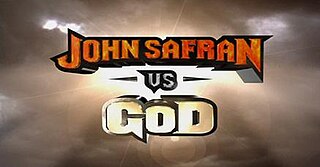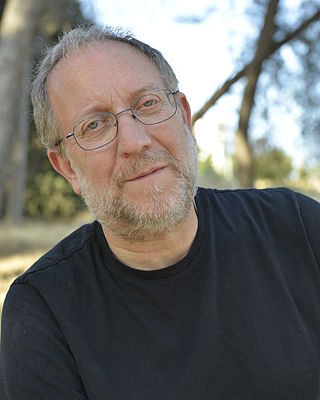Related Research Articles

Zionism is a nationalist movement that espouses the establishment of, and support for a homeland for the Jewish people centered in the area roughly corresponding to what is known in Jewish tradition as the Land of Israel, which corresponds in other terms to the region of Palestine, Canaan, or the Holy Land, on the basis of a long Jewish connection and attachment to that land.

Mohammed Amin al-Husseini was a Palestinian Arab nationalist and Muslim leader in Mandatory Palestine.
Supremacism is the belief that a certain group of people is superior to all others. The supposed superior people can be defined by age, gender, race, ethnicity, religion, sexual orientation, language, social class, ideology, nation, culture, or belong to any other part of a particular population.

Da Ali G Show is a British satirical television series created by and starring English comedian Sacha Baron Cohen. In the series, Baron Cohen plays three unorthodox journalists: faux-streetwise poseur Ali G, Kazakh reporter Borat Sagdiyev, and gay Austrian fashion enthusiast Brüno Gehard. These characters conduct real interviews with unsuspecting people, many of whom are celebrities, high-ranking government officials, and other well-known figures, during which they are asked absurd and ridiculous questions.

Jonathan Safran Foer is an American novelist. He is known for his novels Everything Is Illuminated (2002), Extremely Loud & Incredibly Close (2005), Here I Am (2016), and for his non-fiction works Eating Animals (2009) and We Are the Weather: Saving the Planet Begins at Breakfast (2019). He teaches creative writing at New York University.

John Michael Safran is an Australian radio personality, satirist, documentary maker and author, known for combining humour with religious, political and ethnic issues. First gaining fame appearing in Race Around the World in 1997, Safran went on to produce a series of documentaries, television shows and host radio programs.
John Safran's Music Jamboree was a light-hearted Australian music documentary television series, hosted by John Safran for SBS television. The program was produced by Richard Lowenstein, Selin Yaman and Ghost Pictures and directed by Craig Melville, Richard Lowenstein and a number of other directors under the production company Ghost of Your Ex-Boyfriend Productions in association with SBS Independent. It screened in 2002, and consisted of sketches and outlandish public stunts, typical of Safran's work. The series won two Australian Film Institute Awards; "Best Comedy Series" and "Most Innovative Program Concept". SBS followed the series up with the similarly styled John Safran vs God in 2004.

John Safran vs God is an eight-part television documentary series by John Safran which was broadcast on SBS TV of Australia in 2004. It has been described in a media release as "John Safran's most audacious project yet". It had a much more serious tone than Safran's previous work Music Jamboree. The show was released by Ghost of Your Ex-Boyfriend Productions and SBS Independent, was co-written with Mark O'Toole, directed by Craig Melville, and produced by Richard Lowenstein, Selin Yaman and Ghost Pictures. The production team was known as Ghost of Your Ex-Boyfriend Productions, an amalgamation of John Safran's Ex-Boyfriend Productions, and Richard Lowenstein's Ghost Productions. The series won the 2005 Australian Film Institute Award for Best Comedy Series.

Gilad Atzmon is a British jazz saxophonist, novelist, political activist, and writer.
The Jewish Underground, or in abbreviated form, simply makhteret, was a radical right-wing organization considered terrorist by Israel, formed by prominent members of the Israeli political movement Gush Emunim that existed from 1979 to 1984. Two issues catalyzed the establishment of the underground: One was the signing of the Camp David Accords, which led to the Egypt–Israel peace treaty in 1979, and which the movement, opposed to the peace process, wished to block, viewing it as the first step in the establishment of a Palestinian state in the West Bank. A second element was the settlement project, which, in bringing two distinct ethnic communities into closer proximity, led to an uptick in hostilities that brought about a growing emphasis on the existential threat in both communities. The Jewish Underground developed two operational objectives: One consisted of a plot to blow up the Dome of the Rock, while the other branch concentrated on both avenging acts of Palestinian violence against settlers and of establishing a punitive deterrence. Some understood the terrorist acts as a means of inducing Palestinians to flee their homeland, based on the 1948 and 1967 experience, and parallels are drawn to the Terror Against Terror movement, which had a similar aim. Robert Friedman stated that the Makhteret was "the most violent anti-Arab terrorist organization since the birth of Israel".
Antisemitism in universities has taken place in many countries at various times. Antisemitism has been manifested in various policies and practices, such as restricting the admission of Jewish students by a Jewish quota, or ostracism, intimidation or violence against Jewish students, as well as in the hiring, retention and treatment of Jewish staff. In some instances, universities have supported antisemitic government or social policies and condoned the development of antisemitic cultures on campus. In many jurisdictions, especially since World War II, discriminatory practices, including within the context of a university, are in breach of anti-discrimination laws, though antisemitic cultural values still persists on many campuses.

Yossi Klein Halevi is an American-born Israeli author and journalist.

Nadia Matar (Pikovitch) is a right wing activist in Israel. A Yavneh Olami youth leader, she performed aliyah (immigrated) alone at the age of 18 in 1984, while still in her teens, and married an American doctor, David, a pediatrician at Hadassah Hospital, with whom she has had six children, and settled in Efrat, though she moved her family to Shirat HaYam in Gush Katif in 2004 when Ariel Sharon decided to dismantle Jewish settlements in the Gaza Strip. She has been called by some admirers 'the settlers' Joan of Arc'. She is, together with Yehudit Katsover, the co-chairman of the Nationalist organization Women in Green. She hosts a settler radio show.
Racism in Israel encompasses all forms and manifestations of racism experienced in Israel, irrespective of the colour or creed of the perpetrator and victim, or their citizenship, residency, or visitor status.
Israeli–Arab organ donations refers to organ donations in Israel in which the families of Jews and Arabs killed in the Israeli-Arab conflict donate organs to transplant patients on the "opposite side". Examples are Yoni Jesner, a 19-year-old student at Yeshivat Har Etzion in Gush Etzion, and Ahmed Khatib, a Palestinian boy shot by Israeli Defense Forces soldiers who mistook his toy gun for a real one. The generosity of families prepared to donate the organs of their loved ones under such circumstances has been praised. Their story was also made the subject of an award-winning BBC World Service program, Heart and Soul, in 2007.

The Promise is a British television serial in four episodes written and directed by Peter Kosminsky, with music by Debbie Wiseman. It tells the story of a young woman who goes to present-day Israel and Palestine determined to find out about her soldier grandfather's involvement in the final years of Palestine under the British mandate. It premiered on Channel 4 on 6 February 2011.
Dvir Abramovich is an Israeli-Australian Jewish studies academic, columnist, and editor. Abramovich is the chairman of the Anti-Defamation Commission (ADC), a former division of B'nai B'rith in Melbourne, and director of the Program for Jewish Culture and Society at The University of Melbourne. Abramovich's areas of study are the Hebrew language, Israel and Holocaust studies.
Anabaptists and Jews have had interactions for several centuries, since the origins of Anabaptism in the Radical Reformation in early modern Europe. Due to the insularity of many Anabaptist and Jewish communities, Anabaptist–Jewish relations have historically been limited but there are notable examples of interactions between Anabaptists and Jews. Due to some similarities in dress, culture, and language, Amish and Mennonite communities in particular have often been compared and contrasted to Hasidic Jewish communities.
Charles H. Jordan was an American Jewish humanitarian. He worked for the American Jewish Joint Distribution Committee from 1941, becoming its executive vice president from 1965 until his death in 1967.
References
- ↑ "John Safran's Race Relations".
- ↑ "Comic nailed to cross for 'forensic' insight". Archived from the original on 13 April 2009. Retrieved 11 April 2009.